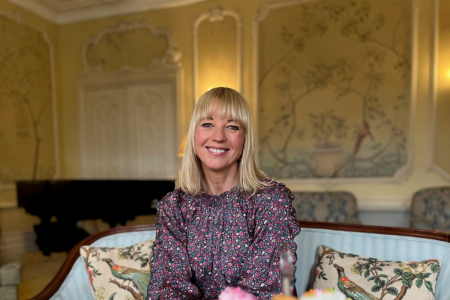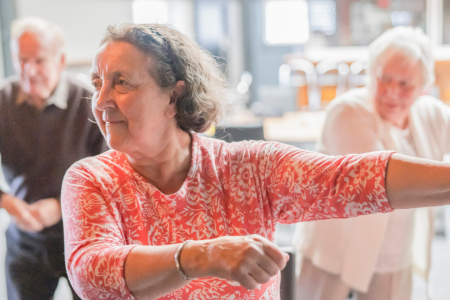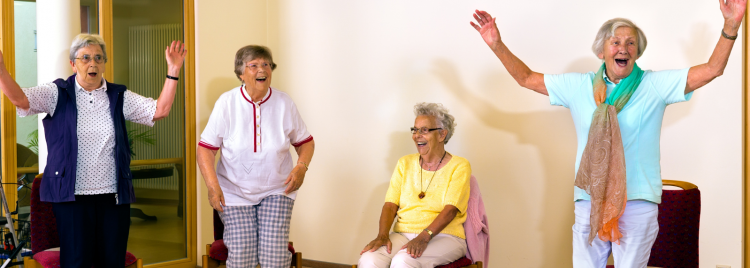We’re all aware that people are, in general, living longer and achieving this longevity is a real achievement. This, combined with reducing birth rates, means that as a society we are getting older. I suspect that we all like to imagine that our later lives will be reasonably healthy and enjoyable. But the research tells us that, even though developments in medicine can give us extra years, those years are in no way guaranteed to be healthy years. Living long but living ill is not such an exciting, shared achievement. What can we do as individuals and as a society to try to improve our health in older age? How can we build a society where we all commit to health? And what small steps might make a difference as we age?
Key factors in determining how ‘well’ we age relate to us as individuals and to the society we live in. As individuals, we can make choices about food or exercise, but we also have inherited predispositions to diseases. And we all share the inevitability of physical decline as we age. At a societal level, we can make, or try to influence, decisions that have a huge impact on health in older age: transport, housing, social facilities, and technological developments all influence the quality of life and health for older people. But many of these feel like intractable problems that are beyond our control.
Wellbeing is a crucial element in our health. Being constantly lonely can have a severe impact on our physical health, for example. Social connectedness is much more than a way to be happier – it reduces risks for a range of illnesses including heart disease and cognitive decline. Meanwhile, too many older people in the UK live in housing that is bad for their health or simply can’t get out as transport links are so poor or so expensive.
But what about other healthy behaviours? Exercise can be seen as the domain of the very fit but gentle exercise has a very real impact on all of us. City and town dwellers who walk to the shops or get the bus are more likely to get their steps in than people who rely on cars. It may not feel like exercise, but taking those steps can have a dramatic impact on health and longevity. But in general, older people have also told us that the things that stop them from going out to do exercise are concerns about cost and – crucially – transport to and from the venue.
As one older person told us: “I know I should do more, but haven’t found a method of doing any more. It’s what they say, isn’t it, that old adage: use it or lose it. I feel eventually I will lose the ability to walk altogether. I never realised what life would be like without transport. People don’t realise, do they? It makes it 10 times worse.”
At Re-engage, we launched our free activity groups for older people in 2020. All of our projects and services are focused on reducing loneliness but we wanted to add to that goal by including gentle exercise and a focus on health. We know from our participants that many older people feel that they would like to do more exercise, including adapted chair exercise for people who are not very mobile any more. A trusted organisation like Re-engage means they feel they are in a safe place. One person commented that she was happy to do the online activity groups as she knew that Re-engage wouldn’t leave her on the floor and unable to get up.
As 80-year-old Audrey told us: “I really enjoy catching up with members of the group after our chair yoga session. There’s always time for a biscuit and a cup of tea. I’ve made friends and we have good chats.
“The chair yoga is relaxing and it keeps me active. I do a bit of exercise at home too – simple stretches and marching on the spot. I set my alarm at 10.00 am and 4pm every day as a reminder.”
There is a chance that any of us might benefit from the social, technological, and medical advances that contribute to longer lives. But if we do, those extra years need to be good ones. Building strong habits is important and building better connections – social connections, transport links, and spaces to share exercise - is crucial.
-
View
More news

BBC Lifeline appeal
TV personality and tea party host Sara Cox is presenting our BBC Lifeline appeal at the end of April. But she won’t be the only star of the show.
There will also be interviews with; ‘dyed in the wool Geordie’, Jane, 87; former journalist and newspaper proprietor Charles, 91; call companion and ballroom dancing enthusiast Kelly, 46 and avid traveller Ginny, 77.
By Re-engage

Using evidence to develop and deliver activity groups
Re-engage impact and evaluation manager Georgina Everett was invited to speak at a webinar organised by the National Academy for Social Prescribing about how the charity uses evidence to develop and deliver activity groups for older people who are experiencing loneliness and social isolation.
By Re-engage

